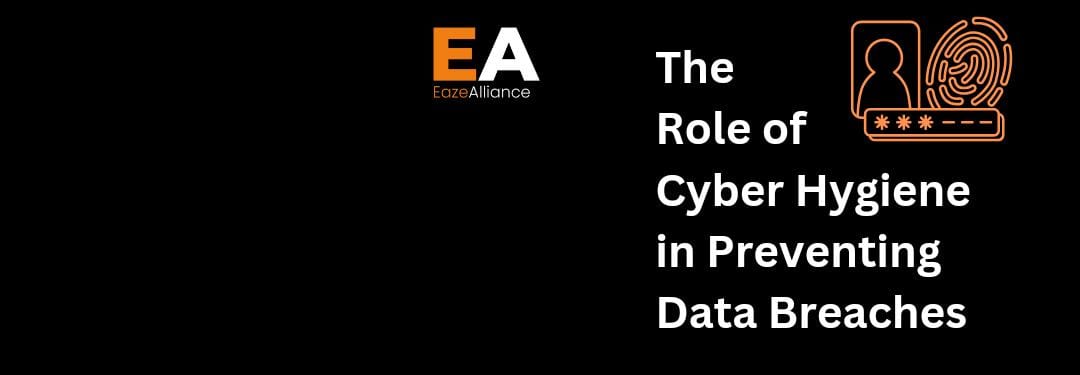The Role of Cyber Hygiene in Preventing Data Breaches
 Eazealliance
Eazealliance 
Introduction
In the realm of cybersecurity, data breaches continue to pose a significant threat to organizations of all sizes. As cybercriminals develop increasingly sophisticated tactics, maintaining robust security measures becomes ever more critical. One of the most effective yet often overlooked strategies for safeguarding sensitive information is practicing good cyber hygiene. This article, brought to you by EazeAlliance, explores the concept of cyber hygiene, its importance in preventing data breaches, and actionable steps organizations can take to bolster their defenses.
1. What is Cyber Hygiene?
Cyber hygiene refers to the set of practices and behaviors that individuals and organizations adopt to maintain and improve their cybersecurity posture. Much like personal hygiene practices prevent illness, cyber hygiene practices are designed to prevent cyber threats and minimize vulnerabilities. These practices are foundational to creating a secure digital environment and include routine tasks and habits that support overall cybersecurity.
2. The Importance of Cyber Hygiene
Effective cyber hygiene is crucial for several reasons:
Preventing Unauthorized Access: Regular updates, strong password policies, and access controls help prevent unauthorized access to sensitive data and systems.
Mitigating Risk: Consistent application of security patches and updates reduces the risk of exploitation from known vulnerabilities.
Reducing Attack Surface: By following cyber hygiene best practices, organizations can minimize the number of potential entry points for cybercriminals.
Enhancing Incident Response: Good cyber hygiene practices facilitate faster identification and response to potential threats or breaches.
3. Key Cyber Hygiene Practices
To effectively implement cyber hygiene and protect against data breaches, organizations should focus on the following practices:
a. Regular Software Updates and Patching
Keeping software, applications, and operating systems up to date is essential. Many cyberattacks exploit known vulnerabilities that have been patched in newer versions of software. Regularly applying patches and updates ensures that your systems are protected against these vulnerabilities.
b. Strong Password Policies
Implementing strong password policies is a fundamental aspect of cyber hygiene. This includes:
Complex Passwords: Enforcing the use of complex passwords that combine letters, numbers, and symbols.
Password Management: Encouraging the use of password managers to store and generate secure passwords.
Regular Changes: Periodically changing passwords and avoiding the reuse of passwords across different accounts.
c. Multi-Factor Authentication (MFA)
MFA adds an extra layer of security by requiring additional verification beyond just a password. This could include something the user knows (a password), something the user has (a phone or security token), or something the user is (biometric data). Implementing MFA significantly reduces the risk of unauthorized access.
d. Data Encryption
Encrypting sensitive data both at rest and in transit helps protect it from unauthorized access. Encryption ensures that even if data is intercepted or accessed by malicious actors, it remains unreadable without the decryption key.
e. Regular Backups
Regularly backing up important data and storing it securely ensures that, in the event of a breach or data loss, you can quickly restore operations. Backups should be tested periodically to ensure they are functional and up-to-date.
f. Security Awareness Training
Educating employees about cybersecurity best practices, phishing threats, and safe online behavior is crucial. Regular training helps build a security-conscious culture and reduces the likelihood of human error leading to data breaches.
g. Access Controls and Monitoring
Implementing strict access controls ensures that only authorized personnel have access to sensitive information. Additionally, monitoring systems for unusual or suspicious activity helps detect potential breaches early and respond quickly.
4. The Role of EazeAlliance in Promoting Cyber Hygiene
EazeAlliance is dedicated to advancing cybersecurity practices and fostering a culture of robust cyber hygiene. Through our initiatives and resources, we support organizations in implementing effective cyber hygiene strategies and staying ahead of emerging threats. Our expertise and tools are designed to help organizations enhance their cybersecurity posture and protect their valuable data.
5. Conclusion
Good cyber hygiene is an essential component of any comprehensive cybersecurity strategy. By adopting and maintaining best practices in cyber hygiene, organizations can significantly reduce their risk of data breaches and enhance their overall security posture. EazeAlliance remains committed to providing guidance and support in this critical area, helping organizations build a resilient defense against the ever-evolving landscape of cyber threats.
For more information on how EazeAlliance can assist with your cybersecurity needs, or to access our resources and tools, visit our website or contact us directly.
Subscribe to my newsletter
Read articles from Eazealliance directly inside your inbox. Subscribe to the newsletter, and don't miss out.
Written by

Eazealliance
Eazealliance
We accelerate your sales cycle while teaching you how easily you can create relationship where clients love to buy from you.